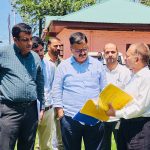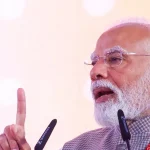The Union Territory of Jammu and Kashmir has undergone a monumental transformation in the past few years. The audacious move by the Union government on August 5, 2019, diluting the special privileges granted to the region under Article 370 and Article 35-A, changed the reality of this troubled region for ages to come. Amidst these developments, certain quarters faced the brunt of an existential apocalypse, and the local political elites of Jammu and Kashmir who for decades thrived on manipulating and exploiting the emotions of the people from Delhi to Kashmir aren’t immune to it. With an uncertain future prevailing over them, the once-prominent figures are struggling to remain relevant in the evolving socio-political scenario.
Mehbooba Mufti stands out among the political class of J&K UT pushed to the margins perhaps sheer out of her unwillingness to assess changing mood of people in the UT. Still, as on date she wants people to follow her politics of annihilation and not what people expect from them in an environment of decay of terrorism that has brought hope. Her political journey has been an epic tale of smart and shrewd manoeuvring, veiled by the pretence of selflessness and self-sacrifice which propelled not only her but the entire family of Mufti into the frontiers of power, privilege, and authority.
Mehbooba Mufti’s meteoric rise in Jammu and Kashmir’s political landscape has been marked by a series of calculated and sometimes contradictory political biddings. She skyrocketed to prominence by forging strategic connections with now-proscribed groups like Jamaat-e-Islami and other separatist organisations, who initially did her bidding in Jammu and Kashmir. Even at the height of separatist calls for election boycotts, Mehbooba’s People’s Democratic Party would manage to get across the line due to perfectly well-coordinated cooperation between Jamaat and other like-minded groups with whom Mehbooba Mufti and her key party workers worked in tandem. Her relationship with Jamaat-e-Islami was well-known among key people responsible for the entire Indian state. A well-known journalist, Suhasini Haidar, while covering a news report for The Hindu in July 2015, on the former R&AW Chief, A.S Dulat’s memoir quoted Dulat as saying that former Indian Prime Minister, Atal Bihari Vajpayee had a deep suspicion over Mehbooba Mufti for being a Jamaat asset. She even goes on to report that Dulat writes that, Vajpayee also felt that Mufti took help from militant organisations to win key seats in the valley in the assembly elections of 2002 in the erstwhile state.
Come 2019, when the central government started cracking down on groups like Jamaat-e-Islami, Mehbooba Mufti rallied against the government’s decision and voiced her open support for Jamaat and other similar groups working in the erstwhile state, a fact now overlooked but widely reported by state as well as national media. One of her key aides and a youth leader of the People’s Democratic Party, Waheed-ur-Rehman Parra, was also arrested by Jammu and Kashmir police under charges of financing and supporting Hizb-ul-Mujahideen. He was charged with heinous allegations while Mehbooba Mufti kept claiming his innocence and alleging political vendetta at the same time.
Mufti portrayed herself as the saviour of the Kashmiri people while engaging with fringe and extremist non-state actors to advance her own ill-motivated political agenda.
In 2015, following the death of her father, the late Mufti Sayeed, Mehbooba Mufti became the first woman chief minister of Jammu and Kashmirin a coalition with the Bharatiya Janata Party. She and her party have often been at odds with BJP but to ascend to the highest seat of government in Jammu and Kashmir, she smartly aligned with them. Propaganda was peddled at her behest that, Mehbooba Mufti would snap ties with the BJP after her father’s death in order to imprint the image of a martyr in the minds of the gullible people of Jammu and Kashmir. After a while, when things started falling in place, she took the oath as the Chief Minister of Jammu and Kashmir with BJP’s support. She was met with severe criticism from her political rivals, who dubbed her continuance with BJP as an “unholy alliance” as it appeared to be at odds with her self-proclaimed soft separatist image. Mufti defended her actions by citing the “agenda of alliance.” During her tenure, she adopted a “don’t do it” approach, often stalling the state machinery and taking a cautious stance on various matters in the interest of her own political ends. To appease separatists, she risked the security of the state as her modus operandi highly banked on the coordination she had with banned and proscribed groups in the valley.
Now the political realities of the region have shifted exponentially which traditional political elites are unwilling to digest. Mehbooba Mufti has reinvented herself once more, now adopting a “do it” approach, where she openly criticizes the government nowadays for not aligning with her wishes. She now tries hard to become an unassailable face of the Gupkar Alliance in order to give another lease of life to her otherwise fading political career.
Her desperate political bidding is serious and quite negative in its manifestation. Mehbooba Mufti’s sudden plunge into a proponent of “do it” advocacy, suggests a possible agenda of deception and cunning political manoeuvring. She has reverted to her earlier political strategies, embracing a soft separatist persona, and courting fringe elements in an attempt to rekindle the embers of separatism in Jammu and Kashmir. Her political switch from “don’t do it” to “do it” seems to be a well-calculated move, to jeopardise the peaceful environment in Jammu and Kashmir through her misadventures and once again bring her back into the conversation of being a serious contender for running the affairs of Jammu and Kashmir.
The shifting positions of Mehbooba Mufti indicate her re-engagement with various segments of the political spectrum reaching as far as across the border. She is a self-proclaimed “martyr,” a “selfless” daughter of a father who passed away as the Chief Minister of a state and handed over the reins of his party to her. She is playing the “outsider versus yours” card to gain sympathy of UT. This is how she is now rebranding herself among the masses of Jammu and Kashmir. The severity and dangers of her misadventures have a trail that has blood in its past, and it is again leading to another violent turbulence of a soul-crushing tragedy this nation cannot afford to suffer or endure.
She should learn how UAE, Qatar and other Muslim ruled nations, even in the Israel-Hamas conflict, have given up religious positions for prosperity of their own people. Propagating terrorists under any garb of ideology is like inviting parasites that eventually feast on hosts. Pakistan is the latest example.
(Author is a Columnist and the views expressed in this article are those of the author and do not represent the stand of this publication)








